Incontinence Advice
Bowel incontinence in the elderly: Methods of caring for them
Bowel incontinence doesn’t have to limit an elderly person’s quality of life. With the right care, management and treatments, it is possible to continue to live fully and comfortably. Learn to manage bowel incontinence effectively in this guide

Bowel incontinence, or faecal incontinence, is the loss of control over bowel movements, often affecting the elderly. This condition can range from an occasional leak of a small amount of stool to having a complete loss of bowel control. In this article, we will discuss various management strategies, such as the use of incontinence products, making dietary and lifestyle changes, the importance of exercises, and when to seek professional healthcare advice.
Key points:
- Discover the causes of bowel incontinence in the elderly
- Learn about lifestyle adjustments that can help to improve symptoms
- Tips for maintaining dignity and comfort while managing symptoms
- Understand the treatments available and when and how to seek professional healthcare advice
- Explore incontinence products for effective bowel incontinence management
Bowel incontinence in the elderly
Understanding bowel incontinence
Bowel incontinence is when you cannot control the passing of stool. This can lead to bowel leakage or a sudden urge to use the toilet, where the individual may not always reach it in time. For the elderly, this condition can be particularly challenging due to reduced mobility, but there are effective bowel incontinence treatments available.
Types of bowel incontinence
Bowel incontinence can be categorised into two main types:
Urge incontinence: This occurs when you feel a strong need to have a bowel movement but are unable to reach the toilet in time, resulting in an accident. It is the most common type and often relates to problems with the muscles that help control bowel movements.
Passive incontinence: In this type, the rectum has reached its maximum capacity to hold stool, but your body does not register the need to go. This leads to passing stool involuntarily, often without awareness. Typically, this is linked to issues with the communication between nerves and muscles.

How common is bowel incontinence?
Bowel incontinence is more common than many might think. Studies suggest that it affects as many as 1 in 10 individuals who see a primary healthcare provider. This number could potentially be higher, as many people do not discuss bowel incontinence, even if they have experienced it.
Signs and symptoms of bowel incontinence
Signs of bowel incontinence can include:
- Unexpected stool leakage when passing wind.
Unexpected stool leakage after being physically active.
A strong urge to defecate without sufficient time to reach the toilet.
Streaks or stains of stool in underwear.
Losing the ability to control your bowel movements entirely.
If you experience these symptoms, it’s important to consult a healthcare professional for a proper diagnosis and treatment plan.
Causes of bowel incontinence
Bowel incontinence can occur for a variety of reasons and is more common as people age. Some primary causes include:
- Diarrhoea can cause temporary bowel incontinence.
Frequent bouts of constipation can weaken your rectal and anal muscles. Straining on the toilet can cause nerve damage. With chronic constipation, the liquid parts of a stool can seep out around the firm stool that’s stuck, leading to incontinence.
- Ageing, hormonal changes, or childbirth can reduce the strength of muscles around the anus, making it harder to control bowel movements.
Conditions like irritable bowel syndrome (IBS) or Crohn’s disease can contribute to faecal incontinence.
Conditions such as dementia, stroke or nerve damage in the spine can reduce awareness of the need to defecate, leading to accidents.
A prolapse is when weakened pelvic muscles can’t fully support your pelvic organs, such as the rectum, vagina, uterus and bladder, and as a result, the organs slip or sag. This can lead to bowel incontinence.
Children can also experience bowel incontinence. More commonly, they will experience giggle incontinence too but this can ease off after a certain age. With bowel incontinence in children, their stool texture will either be too runny or too hard, and they sometimes avoid using the toilet at all, or do not reach it in time.
How will the elderly people feel when experiencing bowel incontinence?
Bowel incontinence can have profound physical and mental effects on elderly individuals.
Physically, it may cause discomfort, irritation, and even skin breakdown due to constant exposure to moisture and stool. This can lead to rashes, sores, or infections if not managed properly.
Mentally, it can trigger feelings of embarrassment, shame, or anxiety, leading to social withdrawal and a loss of confidence. The fear of having an accident in public or around loved ones often results in isolation, impacting overall well-being and quality of life.

Diagnosing bowel incontinence
When diagnosing bowel incontinence, a GP will begin by discussing your symptoms and medical history. This conversation helps determine the possible causes and the next steps for an effective bowel incontinence treatment plan.
The GP might conduct a physical examination, which could include:
A thorough abdominal examination to feel for any irregularities.
A rectal examination, where the doctor checks the muscles and tissues inside the rectum with a gloved finger.
To gather further information, the GP may request a stool sample for laboratory analysis or refer you to a specialist for additional tests, such as:
Blood tests to identify any underlying health conditions.
Colonoscopy, which involves using a thin, flexible tube with a camera to inspect the inside of your bowel.
Ultrasound scans to visualise the structure of your bowels and surrounding organs.
Treatment options for bowel incontinence
The treatment plan for bowel incontinence depends on the cause often begins with lifestyle adjustments and non-invasive approaches.
Your GP may recommend the following:
A balanced diet that promotes an ideal stool consistency, which may involve incorporating more fibre and plenty of fluids. Identifying trigger foods may be recommended if this is thought to be a possible cause of the incontinence.
Current medication may be reviewed to make sure it is not contributing to bowel incontinence. Additional medication may be prescribed, aimed at reducing stool frequency or adjusting stool consistency.
The use of incontinence pads or pants to manage leakage.
Small devices may be recommended that can be inserted into the rectum to help prevent stool leakage.
Surgery may be recommended for people where the above treatments will not work; for example, people with a sphincter defect may benefit from a sphincter repair or, in certain cases, the creation of a stoma.
Specialists can also provide advanced bowel incontinence treatments, which may include:
Kegel exercises to strengthen the pelvic muscles around the anus and improve control.
Biofeedback therapy, which uses sensors to provide feedback and train the relevant muscles for better bowel management.
Bowel retraining, which focuses on establishing a consistent routine for bowel movements.
Advanced techniques for more effective emptying of the lower bowels.

MoliCare® incontinence products for bowel incontinence
Incontinence products can help manage bowel incontinence effectively and improve quality of life for the wearer.
Options include:
- Reusable washable underwear for light to moderate incontinence.
- Incontinence pants for women
- Incontinence products designed for heavier leakage.
- Incontinence bed sheets that protect bedding.
- Incontinence skin care that guards the skin from unwanted diseases, skin irritation, and infections.
For ongoing use, professional advice is recommended to ensure the most suitable products are chosen. Contact your NHS health centre to be put in touch with your local specialist nurse or continence team.
Tips to manage bowel incontinence in the elderly
Managing bowel incontinence effectively involves a combination of preparation and lifestyle adjustments:
Be prepared: Always carry spare pads and pants when going out. Scented bags for soiled items can be useful to manage odour discreetly. A helpful tool is the ‘I Can’t Wait’ Toilet Card, which indicates that you have a medical condition and need urgent access to a toilet.
Plan ahead: Inform friends or family about your needs if travelling long distances to ensure regular stops are scheduled.
Skin care: Maintain good hygiene by washing regularly and drying with a soft towel. Changing pads frequently can prevent irritation. If the skin becomes red or sore, ensure that pads fit well and do not rub. Be sure to opt for MoliCare® incontinence skin care products for effective management and protection. Allow the air to get to the area by wearing loose-fitting clothing. Consult a healthcare professional for further advice on skincare.
Dress for convenience: Choose clothes with elastic waistbands or Velcro fastenings to make dressing and undressing easier.
Home adaptations: Consider equipment like handrails or a commode for added support at home. A care needs assessment by local social services can help identify and provide necessary adaptations.
In conclusion, bowel incontinence in the elderly is a physically and mentally challenging condition; however, with the right approach, it can be managed effectively. Lifestyle changes, incontinence products and treatments recommended by healthcare professionals offer multiple ways to improve comfort and quality of life. Understanding the causes, seeking professional advice and incorporating practical strategies can help elderly individuals manage their symptoms and live with confidence and dignity.
FAQs
What are the non-surgical treatments for bowel incontinence?
Non-surgical options include dietary changes (e.g., increasing fibre intake), bowel training, pelvic floor exercises (known as Kegel exercises), medication (such as antimotility medication, which slows down the passage of stools, enabling more control over bowel movements), and biofeedback therapy to improve muscle control.
How does diet play a role in managing bowel incontinence?
Diet can significantly impact bowel regularity and consistency. Increasing fibre intake can help firm up stool if diarrhoea is a problem, while adequate hydration and a balanced diet can assist in maintaining overall digestive health. Certain foods and drinks can irritate the bladder and bowels and trigger loose stools, so they may need to be avoided.
Can physical therapy help with bowel incontinence?
Yes, physical therapy focusing on the pelvic floor can help strengthen the muscles, improving bowel control. This can also improve general co-ordination and control.
National Institute of Diabetes and Digestive and Kidney Diseases. (2017) Definition & Facts of Faecal Incontinence. [online] Available at:
https://www.niddk.nih.gov/health-information/digestive-diseases/bowel-control-problems-fecal-incontinence/definition-facts [accessed 04/11/2024]
NHS. (2020) NHS website for England. [online] Available at: https://www.nhs.uk/ [accessed 04/11/2024]
Age UK. (2020) Order your free Vivactive Toilet Card today. [online] Available at: https://www.ageukincontinence.co.uk/toilet-card [accessed 04/11/2024]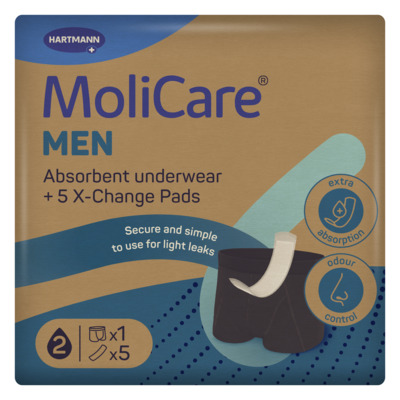 MoliCare® MEN Absorbent underwear + 5 X-Change Pads
<h3><strong>Men's washable incontinence pants with an invisible pad for extra protection</strong></h3>
<p>Feel confidently fresh all day with MoliCare® MEN Absorbent underwear with X-Change Pads. <br />
A discreet, simple-to-use solution for very light bladder weakness. Thanks to a special hidden pocket inside the underwear, you can easily insert a MoliCare X-Change Pad for extra protection which stays securely in place and is invisible. Just look for the layer of extra fabric inside the underwear and slip the pad into it for increased absorbency and security.<br />
With 4 layers of protection and a special leakproof technique MoliCare® MEN Absorbent underwear with X-Change Pads is designed to keep you feeling confident and dry for up to 12 hours*. The X-Change Pad converts liquid into gel to reliably lock away up to 25 teaspoons (approx. 125 ml) of urine and neutralise odours.<br />
The men’s washable incontinence pants are comfortable to wear and have a masculine, timeless design.<br />
Indistinguishable from normal underwear, 83%** of men say the product is a convincing alternative to conventional disposable products. There’s no need to change your underpants throughout the day, simply replace the exchangeable absorbent core whenever you need.<br />
*Hours will vary depending on amount of urine and individual bladder habits.<br />
**Internal test at Paul Hartmann AG, 12/2023, Top 2 Box, n= 16 men, Germany </p>
MoliCare® MEN Absorbent underwear + 5 X-Change Pads
<h3><strong>Men's washable incontinence pants with an invisible pad for extra protection</strong></h3>
<p>Feel confidently fresh all day with MoliCare® MEN Absorbent underwear with X-Change Pads. <br />
A discreet, simple-to-use solution for very light bladder weakness. Thanks to a special hidden pocket inside the underwear, you can easily insert a MoliCare X-Change Pad for extra protection which stays securely in place and is invisible. Just look for the layer of extra fabric inside the underwear and slip the pad into it for increased absorbency and security.<br />
With 4 layers of protection and a special leakproof technique MoliCare® MEN Absorbent underwear with X-Change Pads is designed to keep you feeling confident and dry for up to 12 hours*. The X-Change Pad converts liquid into gel to reliably lock away up to 25 teaspoons (approx. 125 ml) of urine and neutralise odours.<br />
The men’s washable incontinence pants are comfortable to wear and have a masculine, timeless design.<br />
Indistinguishable from normal underwear, 83%** of men say the product is a convincing alternative to conventional disposable products. There’s no need to change your underpants throughout the day, simply replace the exchangeable absorbent core whenever you need.<br />
*Hours will vary depending on amount of urine and individual bladder habits.<br />
**Internal test at Paul Hartmann AG, 12/2023, Top 2 Box, n= 16 men, Germany </p>
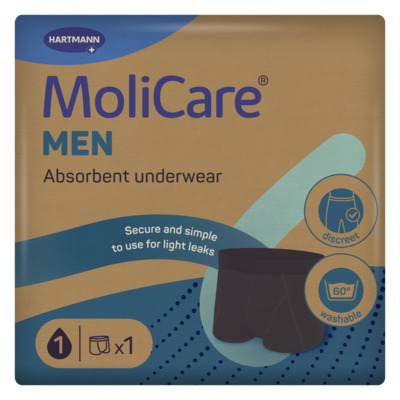 MoliCare® MEN Absorbent underwear
<h2><strong>Protective underwear for drips and dribbles in men</strong></h2>
<p>Get protection for men without the need for pads with MoliCare<sup>®</sup> Men Absorbent underwear. </p>
<p>Offering reliable leak protection, this washable men's underwear securely locks away urine thanks to its quick-dry technology. They look and feel exactly like your regular men’s boxers but with the subtle difference that they can hold up to 10 teaspoons of urine (50 ml). </p>
<p>Designed in Germany, MoliCare<sup>®</sup> Men underwear is dermatologically tested, free of harmful substances and Oeko-Tex 100 certified. Wash this men’s underpants for incontinence at 60° Celsius and use them again and again. </p>
<p><strong>Who is MoliCare<sup>®</sup> Men Absorbent underwear suitable for? </strong></p>
<p>MoliCare<sup>®</sup> Men underwear is for men who experience very light bladder weakness, resulting in small drops of spontaneous urine loss. The invisible men's bladder weakness pants are washable even at 60° Celsius, eliminating odour-causing bacteria.</p>
<p>Designed to look and feel like your normal underwear, they’re easy to put on and off.</p>
<h2><strong>Reusable and convenient solution for drips and dribbles</strong></h2>
<p>Don’t worry about dribbling after urination anymore. MoliCare<sup>®</sup> Men Absorbent underwear are discreet, washable men’s incontinence briefs offering a sustainable, comfortable and skin-friendly alternative to other hygiene products.</p>
<p>Indistinguishable from normal underwear, 87%* of men say the product is a convincing alternative to conventional disposable products.</p>
<p>Free of harmful substances, washable at 60° Celsius and suitable for tumble drying, MoliCare<sup>®</sup> Men Absorbent underwear combines leakproof protection and sustainability with a masculine, yet invisible design so no one will ever know you’re wearing washable incontinence pants. </p>
<p>* Internal test at Paul Hartmann AG, 12/2023, Top 2 Box, n= 16 men, Germany</p>
<p><strong>Caring for your reusable MoliCare<sup>®</sup> Men Absorbent underwear: a step-by-step guide</strong></p>
<ul>
<li>Wash before first use</li>
<li>Rinse out with cold water after use</li>
<li>Use a mild detergent to ensure underwear maintains its functionality. Do not use fabric softeners</li>
<li>Hygienically wash your MoliCare®Absorbent underwear at 60 °C</li>
<li>After washing you can tumble dry your underwear on a low heat</li>
<li>Following these steps will help your underwear stay fresh, clean and ready to wear</li>
</ul>
MoliCare® MEN Absorbent underwear
<h2><strong>Protective underwear for drips and dribbles in men</strong></h2>
<p>Get protection for men without the need for pads with MoliCare<sup>®</sup> Men Absorbent underwear. </p>
<p>Offering reliable leak protection, this washable men's underwear securely locks away urine thanks to its quick-dry technology. They look and feel exactly like your regular men’s boxers but with the subtle difference that they can hold up to 10 teaspoons of urine (50 ml). </p>
<p>Designed in Germany, MoliCare<sup>®</sup> Men underwear is dermatologically tested, free of harmful substances and Oeko-Tex 100 certified. Wash this men’s underpants for incontinence at 60° Celsius and use them again and again. </p>
<p><strong>Who is MoliCare<sup>®</sup> Men Absorbent underwear suitable for? </strong></p>
<p>MoliCare<sup>®</sup> Men underwear is for men who experience very light bladder weakness, resulting in small drops of spontaneous urine loss. The invisible men's bladder weakness pants are washable even at 60° Celsius, eliminating odour-causing bacteria.</p>
<p>Designed to look and feel like your normal underwear, they’re easy to put on and off.</p>
<h2><strong>Reusable and convenient solution for drips and dribbles</strong></h2>
<p>Don’t worry about dribbling after urination anymore. MoliCare<sup>®</sup> Men Absorbent underwear are discreet, washable men’s incontinence briefs offering a sustainable, comfortable and skin-friendly alternative to other hygiene products.</p>
<p>Indistinguishable from normal underwear, 87%* of men say the product is a convincing alternative to conventional disposable products.</p>
<p>Free of harmful substances, washable at 60° Celsius and suitable for tumble drying, MoliCare<sup>®</sup> Men Absorbent underwear combines leakproof protection and sustainability with a masculine, yet invisible design so no one will ever know you’re wearing washable incontinence pants. </p>
<p>* Internal test at Paul Hartmann AG, 12/2023, Top 2 Box, n= 16 men, Germany</p>
<p><strong>Caring for your reusable MoliCare<sup>®</sup> Men Absorbent underwear: a step-by-step guide</strong></p>
<ul>
<li>Wash before first use</li>
<li>Rinse out with cold water after use</li>
<li>Use a mild detergent to ensure underwear maintains its functionality. Do not use fabric softeners</li>
<li>Hygienically wash your MoliCare®Absorbent underwear at 60 °C</li>
<li>After washing you can tumble dry your underwear on a low heat</li>
<li>Following these steps will help your underwear stay fresh, clean and ready to wear</li>
</ul>
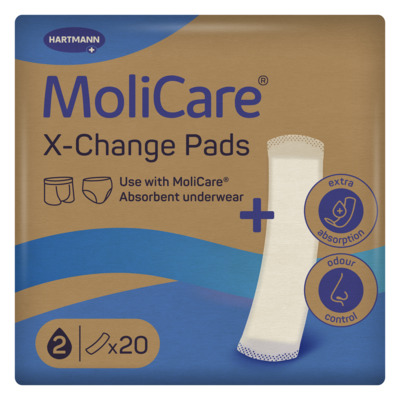 MoliCare® X-Change Pads
<h3><strong>Invisible underwear pads providing extra protection for MoliCare® Absorbent underwear</strong></h3>
<p>Enjoy that dry feeling for up to 12 hours* with MoliCare® X-Change Pads. <br />
Designed to add increased protection to MoliCare® Absorbent underwear, MoliCare® X-Change pads have a highly absorbent core that turns liquid into gel and neutralises unpleasant odours. The pad can hold up to 20 teaspoons (approx. 100 ml) of urine.<br />
Invisible due to the integrated pocket in MoliCare® Absorbent underwear, the pad stays in place and gives you the security of extra leakproof protection when you need it most. Just look for the extra layer of fabric inside the underwear and slip the pad into the pocket for increased absorbency and security against light bladder weakness. This unique concept is patented by HARTMANN.<br />
MoliCare® X-Change incontinence pads for underwear are easy to change and dispose of in public washrooms. Made to reduce disposable waste by 78 % compared to other incontinence products, they are free of silver chloride and other biocides that can have a negative impact on the intimate flora and environment.<br />
*Hours will vary depending on amount of urine and individual bladder habits.</p>
MoliCare® X-Change Pads
<h3><strong>Invisible underwear pads providing extra protection for MoliCare® Absorbent underwear</strong></h3>
<p>Enjoy that dry feeling for up to 12 hours* with MoliCare® X-Change Pads. <br />
Designed to add increased protection to MoliCare® Absorbent underwear, MoliCare® X-Change pads have a highly absorbent core that turns liquid into gel and neutralises unpleasant odours. The pad can hold up to 20 teaspoons (approx. 100 ml) of urine.<br />
Invisible due to the integrated pocket in MoliCare® Absorbent underwear, the pad stays in place and gives you the security of extra leakproof protection when you need it most. Just look for the extra layer of fabric inside the underwear and slip the pad into the pocket for increased absorbency and security against light bladder weakness. This unique concept is patented by HARTMANN.<br />
MoliCare® X-Change incontinence pads for underwear are easy to change and dispose of in public washrooms. Made to reduce disposable waste by 78 % compared to other incontinence products, they are free of silver chloride and other biocides that can have a negative impact on the intimate flora and environment.<br />
*Hours will vary depending on amount of urine and individual bladder habits.</p>
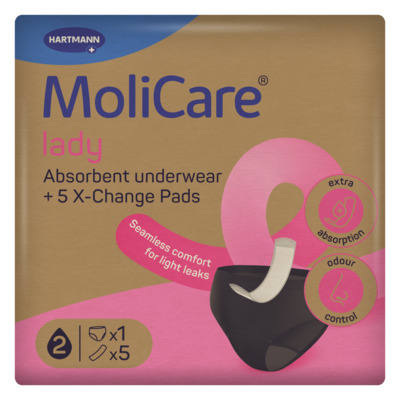 MoliCare® Lady Washable & Absorbent Underwear X-Change Pads
<h2>Why Choose MoliCare<sup>®</sup> washable bladder weakness underwear?</h2>
<p> </p>
<ul>
<li>Unique washable incontinence pants for ladies with a hidden pocket to insert MoliCare<sup>®</sup> X-Change Pads for extra protection</li>
<li>Versatile daily hygiene product for very light bladder weakness</li>
<li>In combination with the exchangeable X-Change Pads, these washable incontinence pants safely lock away up to 30 teaspoons (approx. 149 ml) of urine for a secure, dry feeling</li>
<li>Leakproof pant with a seamless and invisible design for maximum discretion</li>
<li>MoliCare<sup>®</sup> X-Change Pads provide reliable odour control and are easily inserted into the pants and changed as required</li>
<li>Hygienically wash the incontinence pants at 60°C, without the X-Change Pad</li>
<li>78% less plastic waste compared to conventional disposable incontinence products</li>
<li>Suitable for tumble drying</li>
<li>Free of silver chloride and other biocides that can negatively affect vaginal flora</li>
<li>Designed in Germany and made from soft, gentle-on-skin fabrics</li>
<li>This pack contains one pair of women's washable incontinence pants in Size M or Size L plus 5 X-Change-Pads</li>
<li>Designed in Germany and made from soft, gentle-on-skin fabrics</li>
<li>Medium size corresponds to EU size 40/42, or dress size 14-16</li>
</ul>
MoliCare® Lady Washable & Absorbent Underwear X-Change Pads
<h2>Why Choose MoliCare<sup>®</sup> washable bladder weakness underwear?</h2>
<p> </p>
<ul>
<li>Unique washable incontinence pants for ladies with a hidden pocket to insert MoliCare<sup>®</sup> X-Change Pads for extra protection</li>
<li>Versatile daily hygiene product for very light bladder weakness</li>
<li>In combination with the exchangeable X-Change Pads, these washable incontinence pants safely lock away up to 30 teaspoons (approx. 149 ml) of urine for a secure, dry feeling</li>
<li>Leakproof pant with a seamless and invisible design for maximum discretion</li>
<li>MoliCare<sup>®</sup> X-Change Pads provide reliable odour control and are easily inserted into the pants and changed as required</li>
<li>Hygienically wash the incontinence pants at 60°C, without the X-Change Pad</li>
<li>78% less plastic waste compared to conventional disposable incontinence products</li>
<li>Suitable for tumble drying</li>
<li>Free of silver chloride and other biocides that can negatively affect vaginal flora</li>
<li>Designed in Germany and made from soft, gentle-on-skin fabrics</li>
<li>This pack contains one pair of women's washable incontinence pants in Size M or Size L plus 5 X-Change-Pads</li>
<li>Designed in Germany and made from soft, gentle-on-skin fabrics</li>
<li>Medium size corresponds to EU size 40/42, or dress size 14-16</li>
</ul>
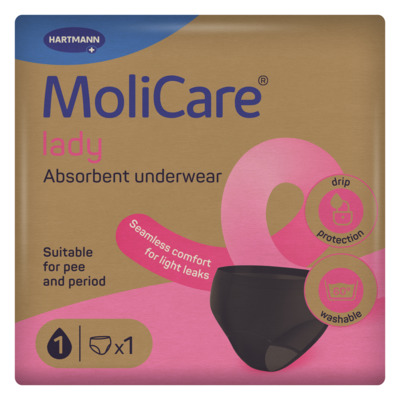 MoliCare® Lady Absorbent Underwear
<h2>Invisible and reliable pee and period underwear</h2>
<p>Whether you’re looking for washable period underwear or eco-friendly incontinence pants, MoliCare<sup>®</sup> Lady Absorbent Underwear is the product you’ve been searching for. </p>
<p>As comfortable as your normal underwear, this women’s absorbent underwear perfectly fits your body with its seamless design to ensure discreet and reliable leakproof protection for both periods and very light bladder weakness. </p>
<p>Free of silver chloride and other biocides, this period underwear does <strong>not </strong>harm your vaginal flora and has <strong>no </strong>negative impact on the environment.<br />
MoliCare<sup>®</sup> Lady Absorbent Underwear is dermatologically tested, Oeko-Tex 100 certified and can be washed and reused as often as normal underwear. Designed in Germany, these incontinence pants are machine washable at 60° Celsius and generate zero waste compared to conventional disposable incontinence products.</p>
<h2>Who is MoliCare<sup>®</sup> Lady Absorbent Underwear suitable for?</h2>
<p>With its feminine design, MoliCare<sup>®</sup> Lady Absorbent Underwear is for women experiencing very light bladder weakness, resulting in spontaneous loss of small urine trickles, and looking for an invisible and sustainable solution. Wash at 60° Celsius to elimiate odour-causing bacteria and wear like regular underwear. They can also be worn during your period.</p>
<h2>Washable period underwear for menstrual leaks</h2>
<p>Don’t worry about those little leaks anymore. MoliCare<sup>®</sup> Lady Absorbent Underwear is a discreet and absorbent washable period underwear offering a sustainable, comfortable, and skin-friendly alternative to other feminine hygiene products. </p>
<p>Free of harmful substances, washable at 60° Celsius and suitable for tumble drying. MoliCare<sup>®</sup> lady Absorbent underwear combines leakproof protection and sustainability with a modern and elegant, yet invisible design so no one will ever know you’re wearing reusable period underwear or washable incontinence pants.</p>
<p><strong>Caring for your reusable MoliCare<sup>®</sup> lady Absorbent underwear: a step-by-step guide</strong></p>
<ul>
<li>Wash at 60 °C before first use</li>
<li>Rinse out with cold water after wearing</li>
<li>Use a mild detergent to ensure underwear maintains its functionality. Do not use fabric softeners</li>
<li>Hygienically wash your MoliCare<sup>®</sup> Absorbent Underwear at 60 °C to eliminate odour-causing bacteria</li>
<li>Tumble dry your underwear on a low heat after washing</li>
<li>Following these steps will help your underwear stay fresh, clean, and ready to wear again. No waste compared to disposable pads: use, wash and reuse</li>
</ul>
MoliCare® Lady Absorbent Underwear
<h2>Invisible and reliable pee and period underwear</h2>
<p>Whether you’re looking for washable period underwear or eco-friendly incontinence pants, MoliCare<sup>®</sup> Lady Absorbent Underwear is the product you’ve been searching for. </p>
<p>As comfortable as your normal underwear, this women’s absorbent underwear perfectly fits your body with its seamless design to ensure discreet and reliable leakproof protection for both periods and very light bladder weakness. </p>
<p>Free of silver chloride and other biocides, this period underwear does <strong>not </strong>harm your vaginal flora and has <strong>no </strong>negative impact on the environment.<br />
MoliCare<sup>®</sup> Lady Absorbent Underwear is dermatologically tested, Oeko-Tex 100 certified and can be washed and reused as often as normal underwear. Designed in Germany, these incontinence pants are machine washable at 60° Celsius and generate zero waste compared to conventional disposable incontinence products.</p>
<h2>Who is MoliCare<sup>®</sup> Lady Absorbent Underwear suitable for?</h2>
<p>With its feminine design, MoliCare<sup>®</sup> Lady Absorbent Underwear is for women experiencing very light bladder weakness, resulting in spontaneous loss of small urine trickles, and looking for an invisible and sustainable solution. Wash at 60° Celsius to elimiate odour-causing bacteria and wear like regular underwear. They can also be worn during your period.</p>
<h2>Washable period underwear for menstrual leaks</h2>
<p>Don’t worry about those little leaks anymore. MoliCare<sup>®</sup> Lady Absorbent Underwear is a discreet and absorbent washable period underwear offering a sustainable, comfortable, and skin-friendly alternative to other feminine hygiene products. </p>
<p>Free of harmful substances, washable at 60° Celsius and suitable for tumble drying. MoliCare<sup>®</sup> lady Absorbent underwear combines leakproof protection and sustainability with a modern and elegant, yet invisible design so no one will ever know you’re wearing reusable period underwear or washable incontinence pants.</p>
<p><strong>Caring for your reusable MoliCare<sup>®</sup> lady Absorbent underwear: a step-by-step guide</strong></p>
<ul>
<li>Wash at 60 °C before first use</li>
<li>Rinse out with cold water after wearing</li>
<li>Use a mild detergent to ensure underwear maintains its functionality. Do not use fabric softeners</li>
<li>Hygienically wash your MoliCare<sup>®</sup> Absorbent Underwear at 60 °C to eliminate odour-causing bacteria</li>
<li>Tumble dry your underwear on a low heat after washing</li>
<li>Following these steps will help your underwear stay fresh, clean, and ready to wear again. No waste compared to disposable pads: use, wash and reuse</li>
</ul>
